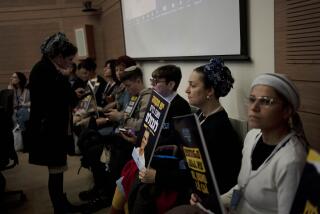Peres Says Hijacking Was Planned for Over a Month
- Share via
JERUSALEM — In his most extensive public remarks on the incident to date, Israeli Prime Minister Shimon Peres said Friday that he understands the TWA hijacking was planned more than a month ago.
He said the hijacking is making it more difficult to release the 760 or so mostly Shia Muslim prisoners held in northern Israel, because Israel must be concerned “not to give the impression of a general surrender to hijackers.”
The hijackers have demanded the release of the Shias as a condition for freeing 40 American hostages from Trans World Airlines Flight 847, most of whom are believed to be held in scattered locations around Beirut.
Peres’ remarks were made in an interview with Israel radio and in a speech later to the general council of the World Zionist Organization in Jerusalem.
Not an Inducement
He used almost the same words in both forums to counter suggestions that the TWA hijackers had been inspired to act by Israel’s May 20 exchange of 1,150 convicted terrorists for three Israeli soldiers captured in the course of Israel’s occupation of Lebanon.
“As far as I know, the planning of this plane’s hijack was done before the (1,150) prisoners were released,” Peres said in answer to a question at the Zionist meeting.
He told Israel radio, “According to everything we know, this airplane hijacking . . . began even before we freed the prisoners, and there’s no connection.”
Peres gave no indication of the source for his statement about the planning of the hijacking, and he could not be reached for further comment. His press secretary, Uri Savir, said he did not know whether the prime minister was referring to intelligence information. He would not try to interpret the remarks.
Criticism in Israel
Whatever the source of the information, Peres was clearly trying to counter widespread criticism of the May 20 prisoner exchange, which in Israel is being condemned almost universally as a mistake. The critics, who contend that such a lopsided exchange encourages terrorist acts, have been especially vocal since the TWA flight from Athens to Rome was seized by Shia Muslim gunmen on June 14.
The 760 prisoners whose freedom the hijackers are demanding are being held at Atlit, just south of Haifa on Israel’s Mediterranean coast. They were among 1,200 who were moved there from a prison camp at Ansar, in southern Lebanon, in April when Israeli troops withdrew from the area.
More than 400 of those prisoners have since been released, and Israel has said that the rest would be freed as soon as the security situation in southern Lebanon makes it feasible.
Earlier reports said 766 Lebanese were being held at Atlit, but Defense Ministry sources said Friday they have re-counted the prisoners and that there are “about 760” imprisoned there. Of those, military sources say, about 570 are Shia Muslims, more than 140 are Palestinians and the rest are Druze, Lebanese Christians and Sunni Muslims.
They have not been tried, but military sources here insisted Friday that they are not innocent.
“Many of them were involved in carrying out terrorist activities against our forces or the SLA (South Lebanon Army, an Israeli-backed militia force),” one source said. Some, he said, “have blood on their hands,” according to Israeli intelligence.
Israel commonly describes as terrorists the Lebanese guerrillas who took up armed resistance to their occupation of southern Lebanon.
Tied Up With Pullout
Peres said Friday the prisoners were to be released as part of Israel’s military withdrawal from Lebanon.
“Up to now, the matter of freeing the prisoners was only a subject that was covered by security considerations in South Lebanon,” he said. “Now there is an additional problem--not to give the impression of a general surrender to hijackers.”
In his address to the council of the World Zionist Organization, Peres said Israel and the United States are leading the fight against international terrorism, and he praised “the determined stand of President Ronald Reagan and Secretary of State George Shultz in their explicit rejection of terrorism, its perpetrators and its supporters.”
These words apparently were intended to ease some of the tension that has crept into the American-Israeli relationship over the TWA hostage crisis. The problem erupted publicly three nights ago, when Israeli Defense Minister Yitzhak Rabin said the United States should “not play games” in connection with the hostages.
Israelis See Hypocrisy
Many Israelis believe that the United States is taking a hypocritical position at Israel’s expense. They see the Reagan Administration as boasting publicly of its determination not to give in to terrorism while privately putting subtle pressure on Israel to release the Atlit prisoners.
Israeli officials have said they will release the Shia prisoners according to their own schedule, independent of the hijackers’ demands, unless the United States publicly asks that the release be speeded up. In that case, they say, the government will reconsider the matter.
Reagan Administration officials have said they will not make such a request to Israel.
Peres, while urging more international cooperation to combat terrorism, also said there should be no hard-and-fast rules in dealing with terrorists. “I don’t see why every terrorist should know how we will behave,” he said. “It is permitted for us to leave them in a fog.
“In a war, sometimes there is retreat. There are tactics and there is strategy. As far as strategy is concerned, there is no country that fought terrorism, fought terrorists and will continue to combat terror, like Israel.”
More to Read
Sign up for Essential California
The most important California stories and recommendations in your inbox every morning.
You may occasionally receive promotional content from the Los Angeles Times.













